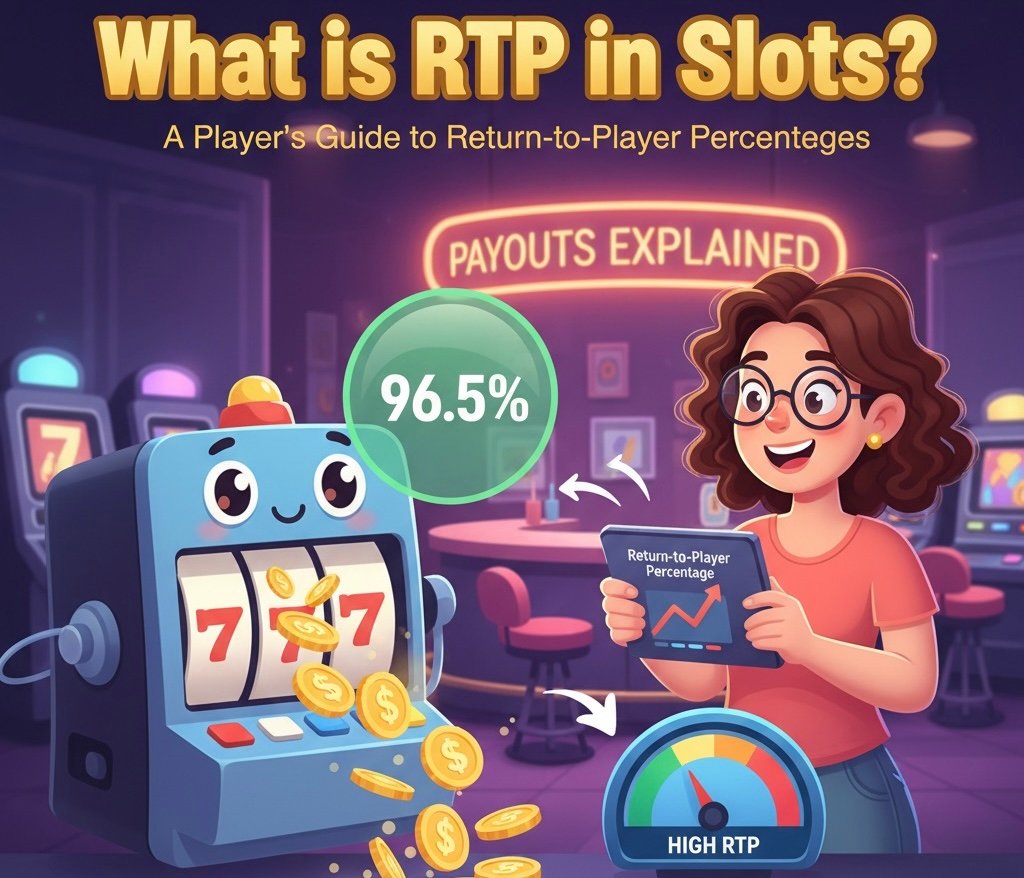Key Takeaways from What is RTP in Slots?
- What is RTP in Slots? It represents the theoretical percentage of wagered money a slot pays back to players over millions of spins, typically ranging from 92% to 97% online.
- Long-term vs Short-term: RTP is a statistical average calculated over a massive timeframe; it does not guarantee winnings in a single session due to variance.
- Strategic Selection: Combining high RTP with the correct volatility level (low, medium, or high) is essential for managing your bankroll and extending playtime.
Every day, thousands of players across the UK log into online casinos, drawn by the flashing lights and potential jackpots of video slots. Yet, many overlook the most critical statistic displayed on the game’s info screen: the Return-to-Player (RTP) percentage. Understanding this metric is the difference between playing blindly and playing smartly.
In this comprehensive guide, we strip away the jargon to explain exactly how these percentages work. We will explore the mathematical relationship between the casino’s edge and your potential returns, debunk common myths, and analyse why a high percentage doesn’t always mean a guaranteed win. Whether you are a casual spinner or a high roller, this knowledge is vital for your gaming strategy at The Casino Count.
What Does RTP Actually Mean for Players?
At its core, RTP (Return to Player) refers to the percentage of all wagered money that a slot machine will pay back to players over time. It is the flip side of the “House Edge,” which is the mathematical advantage the casino holds.
For example, if you play a slot with an RTP of 96%:
- For every £100 theoretically wagered, the machine is programmed to return £96.
- The remaining £4 represents the casino’s gross profit (the House Edge).
However, this is where many players get confused. This figure is calculated over millions of spins, not your individual session. You will rarely wager £100 and walk away with exactly £96. You might lose the entire £100, or you might win £5,000 on your first spin.
How is RTP Calculated?
The calculation is relatively straightforward in theory but complex in execution. Game developers use simulated runs of billions of game rounds to arrive at the certified figure.
The basic formula is:
- RTP = (Total Amount Returned to Players / Total Amount Bet by Players) x 100
In the UK, these figures are audited by independent testing agencies, such as eCOGRA or iTech Labs, to ensure they match the advertised percentage, a requirement strictly enforced by the UK Gambling Commission (UKGC).
Variable RTP: Why the Same Slot Can Have Different Numbers
In the past, a specific slot game had a fixed RTP no matter which casino you played it at. Today, that has changed. Many top game providers (such as Play’n GO, Pragmatic Play, and Red Tiger) now create games with RTP Ranges.
This means developers certify the same game at multiple RTP levels—for example, 96.2%, 94.1%, and 91.5%. Operators can then choose which version to host on their site.
Why does this matter? You could be playing Book of Dead at Casino A with a 96.21% RTP, while Casino B hosts the exact same game with a 87.25% RTP. The gameplay and graphics look identical, but your long-term theoretical return is significantly lower at Casino B.
How to Check the Exact RTP: Never assume the RTP is the standard figure.
- Open the slot game.
- Click the ‘?’ (Help) or ‘i’ (Information) icon.
- Scroll down to the game rules text. The specific RTP for that session will be listed there.
Online vs. Land-Based Slot RTP: The Value Gap
| Setting | Average RTP | Theoretical Return on £100 |
| Pub Fruit Machine | 70% – 80% | £70 – £80 |
| Land-Based Casino | 80% – 90% | £80 – £90 |
| Online Video Slot | 94% – 98% | £94 – £98 |
One of the biggest advantages of playing online is the significantly higher Return-to-Player percentages compared to brick-and-mortar venues.
- Land-Based Casinos/Pubs: Physical slot machines have higher overheads (staff, electricity, rent). Consequently, their RTPs are typically set lower, often ranging from 70% to 90%.
- Online Casinos: With lower overheads and global scalability, online slots generally offer RTPs between 94% and 98%.
Over a long session, this difference is substantial. On a land-based machine with 85% RTP, a £100 wager returns £85 on average. On a 96% online slot, that same £100 wager returns £96. That £11 difference per £100 wagered accumulates rapidly.
Why Does the ‘Theoretical’ RTP Differ from ‘Actual’ Results?
One of the most common questions we receive at The Casino Count is, “I played a 97% RTP slot but lost my entire deposit. Is the game rigged?” The answer lies in the law of large numbers.
The Law of Large Numbers Explained
RTP is a long-term statistical average. In the short term, random number generators (RNGs) ensure that every spin is an independent event, guaranteeing that the outcome of each spin is unpredictable.
- Short Term (1 – 1,000 spins): Anything can happen. Your actual return could be 0% or 2000%. Luck is the dominant factor.
- Medium Term (10,000 – 100,000 spins): Your results may start to trend closer to the theoretical number, but significant deviation is still expected.
- Long Term (1,000,000+ spins): The actual RTP will align almost perfectly with the theoretical RTP.
This discrepancy is known as variance, and it is what makes gambling both exciting and risky.
How Does Volatility Affect RTP?
While RTP tells you how much a slot pays back over time, volatility (or variance) tells you how it pays it back. Two games can both have 96% RTP but behave completely differently.
Low Volatility Slots
- Behaviour: These games pay out frequently but in smaller amounts.
- Player Profile: Ideal for fulfilling wagering requirements or players who want to extend their session with a limited bankroll.
- Example: Starburst (NetEnt). You might get many small wins that keep your balance hovering near your starting point.
High Volatility Slots
- Behaviour: These games can go through long “dry spells” with no wins, followed by a massive payout.
- Player Profile: Suited for risk-takers chasing big jackpots who can withstand significant swings in their bankroll.
- Example: Book of Dead (Play’n GO). You might lose quickly, or you might hit a bonus round that pays 5,000x your stake.
Expert Insight: A high RTP slot with high volatility is often more dangerous to your bankroll in a short session than a lower RTP slot with low volatility.
Does Buying the Bonus Affect RTP?
Many modern slots feature a “Bonus Buy” or “Feature Buy” option, allowing you to pay a premium (usually 50x to 100x your stake) to trigger the main bonus round immediately.
Interestingly, using this feature often changes the RTP. In many games, the RTP for the Bonus Buy is slightly higher than the base game because you are bypassing the lower-paying base game spins.
- Example: A slot might have a standard RTP of 96.10%, but if you buy the bonus, the RTP jumps to 96.60%.
Always check the game’s info sheet, as developers are legally required to state if the RTP changes during a feature buy. However, remember that while the RTP is higher, the volatility is extreme—you are wagering a large lump sum on a single event.
What Are the Best High RTP Slots Available in the UK?
If you are looking to maximise value, choosing slots with higher theoretical returns is a sound strategy. While newer games often hover around 96%, there are classic titles known for their exceptional percentages.
Here are five standouts often found in UK lobbies:
- Mega Joker (NetEnt): Up to 99% (requires optimal strategy).
- Blood Suckers (NetEnt): 98% (famous for its low volatility).
- 1429 Uncharted Seas (Thunderkick): 98.6% (visually unique and high paying).
- Jokerizer (Yggdrasil): 98% (high variance/high reward).
- White Rabbit Megaways (Big Time Gaming): 97.72% (when using the Feature Drop).
Note: Casinos may occasionally offer different RTP versions of the same game. Always check the game rules page (‘?’ or ‘i’ icon) before spinning.
Is High RTP Always Better?
Not necessarily. While a higher percentage implies better value, it shouldn’t be the only factor in your decision.
- Hit Frequency: A game with 98% RTP might have a low hit frequency, meaning you win rarely but win big. If your budget is small, you might run out of funds before that return materialises.
- Max Win Potential: Some high RTP slots are capped at lower max wins (e.g., 500x stake), whereas a slightly lower RTP game might offer 50,000x potential.
- Entertainment Value: Ultimately, you are paying for entertainment. A 94% RTP progressive jackpot slot might be more thrilling than a 97% classic fruit machine.
Understanding Return to Player percentages gives you a statistical edge in game selection, but high theoretical returns are irrelevant if your funds are not secure or the operator refuses to pay out. Fairness is a two-way street involving both the game mathematics and the operator’s overall integrity. For a deeper dive into how payout percentages integrate with overall site security, see Your Guide to Fair & Safe Online Gambling.
How Do UKGC Regulations Protect Players?
The UK Gambling Commission has some of the strictest standards in the world regarding transparency and accountability.
- Mandatory Display: All online slots licensed in the UK must clearly display their RTP within the game’s help files or information screen.
- No ‘Compensated’ Machines Online: Unlike some old pub fruit machines, which might be “due” a win, online slots must be random. The RTP is achieved via probability, not by a memory of previous losses.
- Audit Trails: Operators cannot simply change the RTP on a whim. Changes must be certified and documented.
For more on how regulations affect your gameplay, check out reputable sources like the UK Gambling Commission or see our deep dives at The Casino Count Blog.
Data Case Study: The 10,000 Spin Simulation
To illustrate the reality of Return-to-Player, we ran a hypothetical simulation of 10,000 spins on a standard 96% RTP slot with medium volatility.
The Setup:
- Bet: £1 per spin.
- Total Wagered: £10,000.
- Theoretical Return: £9,600 (Loss of £400).
The Results (Hypothetical Scenarios)
- Player A: Won £12,500 (Actual RTP: 125%) – Hit a lucky bonus round early.
- Player B: Won £9,550 (Actual RTP: 95.5%) – Very close to statistical expectation.
- Player C: Won £6,200 (Actual RTP: 62%) – Caught in a “cold” streak of variance.
The Analysis:
Even after 10,000 spins—a huge amount for a human player—Player C is significantly below the theoretical 96%. This proves that “chasing losses” because a machine “has to pay out” is a fallacy. The math only corrects itself over millions of rounds, far beyond the budget of any individual.
Responsible Gambling Statement
Gambling should always be viewed as a form of entertainment, rather than a means to make money. Understanding RTP helps you make informed choices, but it does not guarantee a win.
- Set Limits: Decide on a budget before you open a game and stick to it.
- Time Outs: Take regular breaks to ensure you remain in control.
- Seek Help: If you feel your gambling is becoming a problem, contact organisations like GambleAware or GamCare.
Conclusion
So, what is RTP in slots? It is a useful guide to the long-term generosity of a game, but it is not a roadmap to instant riches. By understanding the relationship between RTP, volatility, and house edge, you can select games that align with your playstyle and budget.
Remember, the best slot strategy prioritises fun and responsible play.
For more expert insights, unique data analysis, and the latest casino news, keep reading The Casino Count.
Contact Us:
Do you have questions about slot mechanics, or would you like us to review a specific game?
Email: info@thecasinocount.com
Is the RTP calculated on every spin?
No. RTP is a long-term theoretical average calculated over millions (often billions) of spins. In the short term, your results are determined by the Random Number Generator (RNG) and can vary wildly from the stated percentage.
Can a casino change the RTP of a slot while I am playing?
No. Under UKGC regulations, a casino cannot alter the RTP of a game mid-session. However, they can choose to host a lower RTP version of a game (Variable RTP) before you start playing, which is why it is vital to check the game rules first.
Which online slot has the highest RTP?
Historically, Mega Joker (NetEnt) is cited as having one of the highest RTPs (up to 99%), though this depends on playing in “Supermeter” mode with optimal strategy. Other high-ranking titles include Book of 99 by Relax Gaming (99%) and 1429 Uncharted Seas by Thunderkick (98.6%).
Does bet size affect RTP?
In most modern video slots, bet size does not affect RTP. However, some older progressive jackpot slots or classic games may offer a slightly higher RTP if you bet the maximum number of coins. Always read the paytable to be sure.
Is a 96% RTP good?
Yes, 96% is considered the industry standard for online slots. Anything above 97% is considered excellent (High RTP), while anything below 94% is considered poor for an online video slot.






Leave a Reply